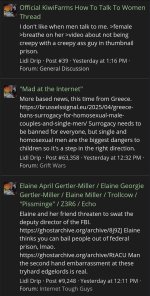Sneeder Griffin
Remarkable Onion
Most of them are election tourists that only started browsing 4chan in 2016 and never left /pol/.The 4chan feature is impossible to read through because it's nonstop posts of people crying about how the site went downhill and their personal anecdotes on a site they wasted almost twenty years on, since all seem to pretend to have started posting before 2010.
Outside of /b/ and /pol/ turning to shit, 4chan is largely the same as it was 10-15 years ago. While there are legitimate complaints about modern 4chan (annoying email bullshit, constant CAPTCHAs, some of the jannies being a bit overzealous, etc...), it still has a ton of freedom in terms of what you are allowed to talk about and the jannies are relatively hands off compared to most sites. While I don't respect jannies on any site, I would take 4chan jannies over someone like Null or Trombonista or Bardfinn any day of the week.
In my 15+ years of browsing 4chan, I have been banned around 50 times, mostly for intentionally posting off-topic threads on /v/ and /sp/ or for intentionally posting porn on SFW boards. There are maybe 5 occasions where I got a banned that I thought was unjustified, none longer than 5 days. On those occasions, I either flipped my router on and off to get a new IP or switched over to using data on my phone and continued to shitpost.
I find that most of the time when people are crying about bans, they are bitching because their "Race and IQ" thread was deemed "off-topic" for the Television & Film board or some stupid shit like that. While there are certainly bad jannies and unjustified bans on 4chan, most of the whining comes from /pol/tards who migrate to other boards, start off-topic threads about nigger hate or tranny hate, weand act surprised when they get a three day ban for "off-topic posting".










